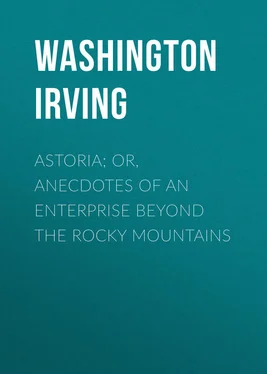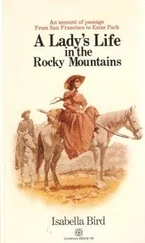Washington Irving - Astoria; Or, Anecdotes of an Enterprise Beyond the Rocky Mountains
Здесь есть возможность читать онлайн «Washington Irving - Astoria; Or, Anecdotes of an Enterprise Beyond the Rocky Mountains» — ознакомительный отрывок электронной книги совершенно бесплатно, а после прочтения отрывка купить полную версию. В некоторых случаях можно слушать аудио, скачать через торрент в формате fb2 и присутствует краткое содержание. Жанр: foreign_antique, foreign_prose, на английском языке. Описание произведения, (предисловие) а так же отзывы посетителей доступны на портале библиотеки ЛибКат.
- Название:Astoria; Or, Anecdotes of an Enterprise Beyond the Rocky Mountains
- Автор:
- Жанр:
- Год:неизвестен
- ISBN:нет данных
- Рейтинг книги:5 / 5. Голосов: 1
-
Избранное:Добавить в избранное
- Отзывы:
-
Ваша оценка:
- 100
- 1
- 2
- 3
- 4
- 5
Astoria; Or, Anecdotes of an Enterprise Beyond the Rocky Mountains: краткое содержание, описание и аннотация
Предлагаем к чтению аннотацию, описание, краткое содержание или предисловие (зависит от того, что написал сам автор книги «Astoria; Or, Anecdotes of an Enterprise Beyond the Rocky Mountains»). Если вы не нашли необходимую информацию о книге — напишите в комментариях, мы постараемся отыскать её.
Astoria; Or, Anecdotes of an Enterprise Beyond the Rocky Mountains — читать онлайн ознакомительный отрывок
Ниже представлен текст книги, разбитый по страницам. Система сохранения места последней прочитанной страницы, позволяет с удобством читать онлайн бесплатно книгу «Astoria; Or, Anecdotes of an Enterprise Beyond the Rocky Mountains», без необходимости каждый раз заново искать на чём Вы остановились. Поставьте закладку, и сможете в любой момент перейти на страницу, на которой закончили чтение.
Интервал:
Закладка:
Such is the melancholy story of the Tonquin, and such was the fate of her brave but headstrong commander, and her adventurous crew. It is a catastrophe that shows the importance, in all enterprises of moment, to keep in mind the general instructions of the sagacious heads which devise them. Mr. Astor was well aware of the perils to which ships were exposed on this coast from quarrels with the natives, and from perfidious attempts of the latter to surprise and capture them in unguarded moments. He had repeatedly enjoined it upon Captain Thorn, in conversation, and at parting, in his letter of instructions, to be courteous and kind in his dealings with the savages, but by no means to confide in their apparent friendship, nor to admit more than a few on board of his ship at a time.
Had the deportment of Captain Thorn been properly regulated, the insult so wounding to savage pride would never have been given. Had he enforced the rule to admit but a few at a time, the savages would not have been able to get the mastery. He was too irritable, however, to practice the necessary self-command, and, having been nurtured in a proud contempt of danger, thought it beneath him to manifest any fear of a crew of unarmed savages.
With all his faults and foibles, we cannot but speak of him with esteem, and deplore his untimely fate; for we remember him well in early life, as a companion in pleasant scenes and joyous hours. When on shore, among his friends, he was a frank, manly, sound-hearted sailor. On board ship he evidently assumed the hardness of deportment and sternness of demeanor which many deem essential to naval service. Throughout the whole of the expedition, however, he showed himself loyal, single-minded, straightforward, and fearless; and if the fate of his vessel may be charged to his harshness and imprudence, we should recollect that he paid for his error with his life.
The loss of the Tonquin was a grievous blow to the infant establishment of Astoria, and one that threatened to bring after it a train of disasters. The intelligence of it did not reach Mr. Astor until many months afterwards. He felt it in all its force, and was aware that it must cripple, if not entirely defeat, the great scheme of his ambition. In his letters, written at the time, he speaks of it as “a calamity, the length of which he could not foresee.” He indulged, however, in no weak and vain lamentation, but sought to devise a prompt and efficient remedy. The very same evening he appeared at the theatre with his usual serenity of countenance. A friend, who knew the disastrous intelligence he had received, expressed his astonishment that he could have calmness of spirit sufficient for such a scene of light amusement. “What would you have me do?” was his characteristic reply; “would you have me stay at home and weep for what I cannot help?”
CHAPTER XII
Gloom at Astoria – An Ingenious Stratagem. – The Small-Pox Chief. – Launching of the Dolly. – An Arrival. – A Canadian Trapper. – A Freeman of the Forest – An Iroquois Hunter. – Winter on the Columbia. – Festivities of New Year.
THE tidings of the loss of the Tonquin, and the massacre of her crew, struck dismay into the hearts of the Astorians. They found themselves a mere handful of men, on a savage coast, surrounded by hostile tribes, who would doubtless be incited and encouraged to deeds of violence by the late fearful catastrophe. In this juncture Mr. M’Dougal, we are told, had recourse to a stratagem by which to avail himself of the ignorance and credulity of the savages, and which certainly does credit to his ingenuity.
The natives of the coast, and, indeed, of all the regions west of the mountains, had an extreme dread of the small-pox; that terrific scourge having, a few years previously, appeared among them, and almost swept off entire tribes. Its origin and nature were wrapped in mystery, and they conceived it an evil inflicted upon them by the Great Spirit, or brought among them by the white men. The last idea was seized upon by Mr. M’Dougal. He assembled several of the chieftains whom he believed to be in the conspiracy. When they were all seated around, he informed them that he had heard of the treachery of some of their northern brethren towards the Tonquin, and was determined on vengeance. “The white men among you,” said he, “are few in number, it is true, but they are mighty in medicine. See here,” continued he, drawing forth a small bottle and holding it before their eyes, “in this bottle I hold the small-pox, safely corked up; I have but to draw the cork, and let loose the pestilence, to sweep man, woman, and child from the face of the earth.”
The chiefs were struck with horror and alarm. They implored him not to uncork the bottle, since they and all their people were firm friends of the white men, and would always remain so; but, should the small-pox be once let out, it would run like wildfire throughout the country, sweeping off the good as well as the bad; and surely he would not be so unjust as to punish his friends for crimes committed by his enemies.
Mr. M’Dougal pretended to be convinced by their reasoning, and assured them that, so long as the white people should be unmolested, and the conduct of their Indian neighbors friendly and hospitable, the phial of wrath should remain sealed up; but, on the least hostility, the fatal cork should be drawn.
From this time, it is added, he was much dreaded by the natives, as one who held their fate in his hands, and was called, by way of preeminence, “the Great Small-pox Chief.”
All this while, the labors at the infant settlement went on with unremitting assiduity, and, by the 26th of September, a commodious mansion, spacious enough to accommodate all hands, was completed. It was built of stone and clay, there being no calcarcous stone in the neighborhood from which lime for mortar could be procured. The schooner was also finished, and launched, with the accustomed ceremony, on the second of October, and took her station below the fort. She was named the Dolly, and was the first American vessel launched on this coast.
On the 5th of October, in the evening, the little community at Astoria was enlivened by the unexpected arrival of a detachment from Mr. David Stuart’s post on the Oakinagan. It consisted of two of the clerks and two of the privates. They brought favorable accounts of the new establishment, but reported that, as Mr. Stuart was apprehensive there might be a difficulty of subsisting his whole party throughout the winter, he had sent one half back to Astoria, retaining with him only Ross, Montigny, and two others. Such is the hardihood of the Indian trader. In the heart of a savage and unknown country, seven hundred miles from the main body of his fellow-adventurers, Stuart had dismissed half of his little number, and was prepared with the residue to brave all the perils of the wilderness, and the rigors of a long and dreary winter.
With the return party came a Canadian creole named Regis Brugiere and an Iroquois hunter, with his wife and two children. As these two personages belong to certain classes which have derived their peculiar characteristics from the fur trade, we deem some few particulars concerning them pertinent to the nature of this work.
Brugiere was of a class of beaver trappers and hunters technically called “Freemen,” in the language of the traders. They are generally Canadians by birth, and of French descent, who have been employed for a term of years by some fur company, but, their term being expired, continue to hunt and trap on their own account, trading with the company like the Indians. Hence they derive their appellation of Freemen, to distinguish them from the trappers who are bound for a number of years, and receive wages, or hunt on shares.
Having passed their early youth in the wilderness, separated almost entirely from civilized man, and in frequent intercourse with the Indians, they relapse, with a facility common to human nature, into the habitudes of savage life. Though no longer bound by engagements to continue in the interior, they have become so accustomed to the freedom of the forest and the prairie, that they look back with repugnance upon the restraints of civilization. Most of them intermarry with the natives, and, like the latter, have often a plurality of wives. Wanderers of the wilderness, according to the vicissitudes of the seasons, the migrations of animals, and the plenty or scarcity of game, they lead a precarious and unsettled existence; exposed to sun and storm, and all kinds of hardships, until they resemble Indians in complexion as well as in tastes and habits. From time to time, they bring the peltries they have collected to the trading houses of the company in whose employ they have been brought up. Here they traffic them away for such articles of merchandise or ammunition as they may stand in need of. At the time when Montreal was the great emporium of the fur trader, one of these freemen of the wilderness would suddenly return, after an absence of many years, among his old friends and comrades. He would be greeted as one risen from the dead; and with the greater welcome, as he returned flush of money. A short time, however, spent in revelry, would be sufficient to drain his purse and sate him with civilized life, and he would return with new relish to the unshackled freedom of the forest.
Читать дальшеИнтервал:
Закладка:
Похожие книги на «Astoria; Or, Anecdotes of an Enterprise Beyond the Rocky Mountains»
Представляем Вашему вниманию похожие книги на «Astoria; Or, Anecdotes of an Enterprise Beyond the Rocky Mountains» списком для выбора. Мы отобрали схожую по названию и смыслу литературу в надежде предоставить читателям больше вариантов отыскать новые, интересные, ещё непрочитанные произведения.
Обсуждение, отзывы о книге «Astoria; Or, Anecdotes of an Enterprise Beyond the Rocky Mountains» и просто собственные мнения читателей. Оставьте ваши комментарии, напишите, что Вы думаете о произведении, его смысле или главных героях. Укажите что конкретно понравилось, а что нет, и почему Вы так считаете.












